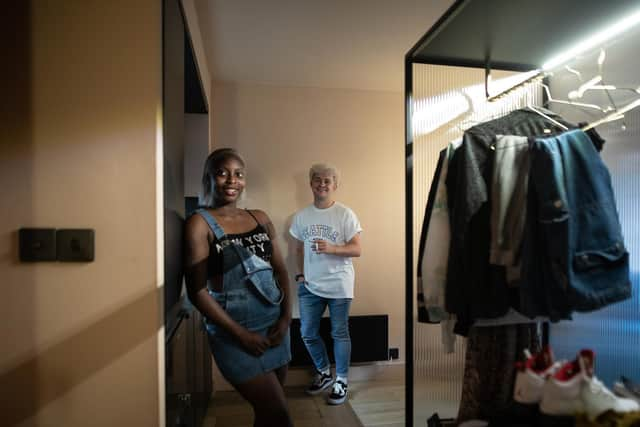"I wasn’t scared at all": Preston carer on working at Covid Nightingale Hospital
and live on Freeview channel 276
When she returned at the beginning of May, the venue previously known as the GMEX had been rebadged again and was now an NHS Nightingale Hospital – while Ivy was kitted out in personal protective equipment, preparing to care for the victims of a pandemic.
The bouncy castle which sat in the centre of the vast space during her previous visit had been replaced by row upon row of beds as the North West became the latest part of the country braced for a burgeoning number of coronavirus patients.
Advertisement
Hide AdAdvertisement
Hide AdThe contrast was not lost on the care support worker from Preston, but the choice she had made to be there was almost instinctive.


“After reading through the job description, I thought it was so risky,” Ivy recalls.
“But then I considered it a bit more and decided I might as well just do it – I just thought [I should do] anything I could to help.”
Even the most experienced NHS staff were unlikely to have been fully prepared for life on the Covid frontline, but this high-pressure setting was Ivy’s first taste of working in a hospital environment. Having qualified only two years ago, the 24-year-old admits to being daunted at the prospect of the job during the first few days – but says she never felt the fear that her family did on her behalf.
Advertisement
Hide AdAdvertisement
Hide Ad“When I applied my Mum was like, ‘Are you crazy?’ She thought it was really brave and a few other people said the same thing.
“But it’s not how I’d describe it – you don’t think about it really, so I wasn’t scared at all.
“Getting used to wearing the PPE was probably the worst part of all – it makes the job so much harder. My first week was during a heatwave – so I’d walk to work in the heat, then go into the hospital and put the mask and visor on.
“Because it’s so busy, you’re moving around really quickly and it just gets so warm.”
Advertisement
Hide AdAdvertisement
Hide AdIt had initially been expected that the Nightingale facilities across the country would be needed for the sickest Covid patients, but the eventual case numbers meant that the most gravely ill were able to stay in ordinary hospital facilities. The temporary units were instead largely used to house those not in need of ventilation, but a place of rehabilitation before being allowed back home.
Ivy says that the hospital’s cohort of largely elderly patients and the situation in which they found themselves made for a special experience for staff like her – and certainly not the image which Covid care usually conjures up.
“We’d be feeding, doing personal care and taking observations – but we also spent time just sitting with patients and keeping them entertained a lot of the time.
“Some were just starting to come round after being very ill. They weren’t allowed to have their family there – but they were of sound mind and knew what was happening.
Advertisement
Hide AdAdvertisement
Hide Ad“They had questions [about their own care] and they also just wanted some conversation and to know what was going on with the world.
“They’d all led very interesting lives – I’ve met the most amazing people and they were willing to tell you all sorts about [their experiences].
“There was one gentleman who came the week before I started and I watched his progress until the day before my last shift when he was discharged. That was a nice feeling to watch him progressively get better and start eating by himself – you could see the difference we were making.
“It’s been an experience – that’s probably the best way to put it. Obviously it wasn’t all roses, it was a hospital in the middle of a crisis. But I wouldn’t take back a single second of it,” Ivy reflects.
Advertisement
Hide AdAdvertisement
Hide AdThroughout her time at the North West Nightingale, she has been living in accommodation donated by a nearby hotel to avoid the added hassle of a daily commute from Lancashire – but also to protect her diabetic dad who she lives with at the family home back in Preston.
With the hospital facility now in standby mode after the last patient was discharged, Ivy is currently still staying at the hotel, where she is halfway through a 14-day isolation period before she can return to her proud and close-knit family. “Facetime isn’t really enough anymore,” she says.
However, the much deserved downtime has given her a chance to reflect on the intensity of the past two months and what she wants to do next with her life.
“The best thing about the Nightingale was the team. We all had so many different backgrounds – there was a bricklayer who had care certificates from years ago, there were people who had retired and come back to the NHS and people who were seconded.
“But when we all came together it just worked.
Advertisement
Hide AdAdvertisement
Hide Ad“I’m now hoping to do my paramedic training at university in January,” says Ivy, who has previously worked as a call handler at the Broughton base of the North West Ambulance Service.
“That’s the dream anyway.”
And surely one which will be achieved by someone who has already helped so many patients get through a nightmare.